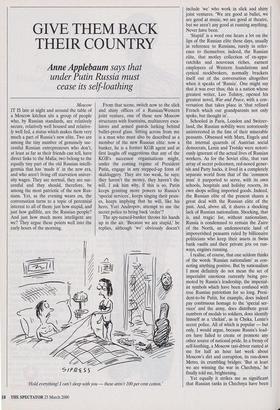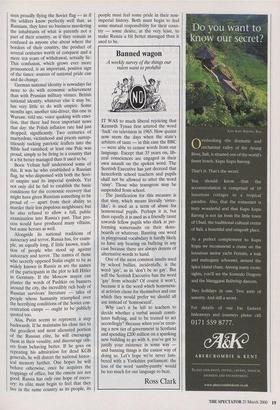GIVE THEM BACK THEIR COUNTRY
Anne Applebaum says that
under Putin Russia must cease its self-loathing
Moscow IT IS late at night and around the table of a Moscow kitchen sits a group of people who, by Russian standards, are relatively secure, relatively well housed and relative- ly well fed, a status which makes them very much a part of Russia's new elite. Two are among the tiny number of genuinely suc- cessful Russian entrepreneurs who don't, at least as far as their friends can tell, have direct links to the Mafia; two belong to the equally tiny part of the old Russian intelli- gentsia that has 'made it' in the new era, and who aren't living off starvation univer- sity wages. They are normal, they are suc- cessful and they should, therefore, be among the most patriotic of the new Rus- sians. Yet, as the evening wears on, the conversation turns to a topic of perennial interest to all of them: just how stupid, and just how gullible, are the Russian people? And just how much more intelligent are we? They argue these points well into the early hours of the morning. From that scene, switch now to the slick and shiny offices of a Russian/Western joint venture, one of those new Moscow structures with fountains, multistorey esca- lators and armed guards lurking behind bullet-proof glass. Sitting across from me is a man who must also be described as a member of the new Russian elite: now a banker, he is a former KGB agent and at first laughs off suggestions that any of the KGB's successor organisations might, under the coming regime of President Putin, engage in any stepped-up form of skulduggery. They are too weak, he says; they haven't the money, they haven't the will. I ask him why, if this is so, Putin keeps granting more powers to Russia's 'special services', keeps singing their prais- es, keeps implying that he will, like his hero, Yuri Andropov, attempt to use the secret police to bring back 'order'?
The spy-turned-banker throws his hands up in the air. 'Because we are stupid,' he replies, although 'we' obviously doesn't 'Hold everything! I can't sleep with you — these aren't 100 per cent cotton.' include 'we' who work in slick and shiny joint ventures. 'We are good at ballet, we are good at music, we are good at theatre, but we aren't any good at running anything. Never have been.'
'Stupid' is a word one hears a lot on the lips of the Russian elite these days, usually in reference to Russians, rarely in refer- ence to themselves; indeed, the Russian elite, that motley collection of ex-appa- ratchiks and nouveaux riches, earnest employees of Western foundations and cynical stockbrokers, normally brackets itself out of the conversation altogether when it speaks of 'Russia'. One might say that it was ever thus; this is a nation whose greatest writer, Leo Tolstoy, opened his greatest novel, War and Peace, with a con- versation that takes place in 'that refined French which our grandparents not only spoke, but thought in'.
Schooled in Paris, London and Switzer- land, the Russian nobility were notoriously uninterested in the fate of their miserable peasants. Obsessed with Marx, Engels and the internal quarrels of Austrian social democrats, Lenin and Trotsky were notori- ously ignorant of the actual lives of Russian workers. As for the Soviet elite, that vast array of secret policemen, red-nosed gener- als and Party hacks, it lived in a completely separate world from that of the 'common man' it purported to serve, with its own schools, hospitals and holiday resorts, its own shops selling imported goods. Indeed, the Russian elite of the present shares a great deal with the Russian elite of the past. And, above all, it shares a shocking lack of Russian nationalism. Shocking, that is, and tragic: for, without nationalism, Russia is condemned to remain the Zaire of the North, an undemocratic land of impoverished peasants ruled by billionaire politicians who keep their assets in Swiss bank vaults and their private jets on run- ways, engines running.
I realise, of course, that one seldom thinks of the words 'Russian nationalism' as con- noting anything positive. But by nationalism I most definitely do not mean the set of imperialist emotions currently being pro- moted by Russia's leadership, the imperial- ist symbols which have been confused with true Russian patriotism for so long. Presi- dent-to-be Putin, for example, does indeed pay continuous homage to the 'special ser- vices' and the army, does distribute great numbers of medals to soldiers, does identify himself as a `chelcisf, as in Cheka, Lenin's secret police. All of which is popular — but only, I would argue, because Russia's lead- ers have failed to create or promote any other source of national pride. In a frenzy of self-loathing, a Moscow taxi-driver ranted at me for half an hour last week about Moscow's dirt and corruption, its run-down Metro, its crumbling bridges. 'But at least we are winning the war in Chechnya,' he finally told me, brightening.
Yet equally it strikes me as significant that Russian tanks in Chechnya have been seen proudly flying the Soviet flag — as if the soldiers know perfectly well that, as Russians, they have no business murdering the inhabitants of what is patently not a part of their country, as if they remain as confused as anyone else about where the borders of their country, the product of several centuries worth of conquest and a mere ten years of withdrawal, actually lie. This confusion, which grows ever more pronounced, is an important, positive sign of the times: sources of national pride can and do change.
German national identity is nowadays far more to do with economic achievement than with Prussian military virtues. British national identity, whatever else it may be, has very little to do with empire. Some months ago, another taxi-driver, this one in Warsaw, told me, voice quaking with emo- tion, that there had been important news that day: the Polish inflation rate had just dropped, significantly. Two centuries of martyrdom, victimhood and priests surrep- titiously tucking patriotic leaflets into the Bible had vanished; at least one Pole was proud, simply to be living in a country that is a bit better managed than it used to be.
Boris Yeltsin half understood some of this. It was he who established a Russian flag, he who dispensed with both the Sovi- et empire and its imperial symbols. Yet not only did he fail to establish the basic conditions for the economic .recovery that might have given Russians something to be proud of — apart from their ability to murder their less populous neighbours; but he also refused to allow a full, public examination into Russia's past. That pro- cess would have produced many villains, but some heroes as well.
Alongside its national traditions of autocracy and terror, Russia has, for exam- ple, an equally long, if little known, tradi- tion of people who stood up against autocracy and terror. The names of those who secretly opposed Stalin ought to be as widely known in Russia as are the names of the participants in the plot to kill Hitler in Germany. If the Moscow mayor can plaster the words of Pushkin on banners around the city, the incredibly rich body of Russian survivors' literature — tales of people whose humanity triumphed over the horrifying conditions of the Soviet con- centration camps — ought to be publicly quoted too.
Alas, Putin seems to represent a step backwards. If he maintains his close ties to the greediest and most alienated portion of the Russian elite, he will encourage them in their venality, and discourage oth- ers from behaving better. If he goes on repeating his admiration for dead KGB generals, he will distort the national histor- ical memory further. One hopes he will behave otherwise, once he acquires the trappings of office, but the omens are not good. Russia has only one hope of recov- ery: its elite must begin to feel that they live in the same country as its people, its people must feel some pride in their non- imperial history. Both must begin to feel some mutual responsibility for their coun- try — some desire, at the very least, to make Russia a bit better managed than it used to be.



































































 Previous page
Previous page